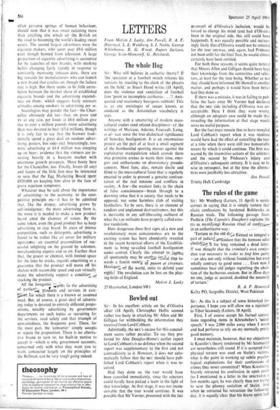Bowled out
Sir: In his excellent article on the d'Oliveira affair (18 April), Christopher Hollis seemed rather too hasty in attacking Mr Allen and Mr Gilligan for withholding the information they received from Lord Cobham.
Admittedly, the mcc's excuse for this conceal- ment seems rather peculiar. To say they pre- ferred Sir Alec Douglas-Home's earlier report to Lord Cobham's is no defence when the second report was supplementary to the first and not contradictory to it. However, it does not auto- matically follow that the MCC should have pub- lished Lord Cobham's report when it was re- ceived.
Had they done so, the tour would have been cancelled immediately, since the selectors could hardly have picked a team in the light of that knowledge. At that stage, it was not incon- ceivable that the tour would continue. It was possible that Mr Vorster, presented with the fait accompli of d'Oliveira's inclusiod, would be forced to change his mind (and had d'Oliveira, been in the original side, this still could have happened). It was equally possible and increas- ingly likely that d'Oliveira would not be selected for the tour anyway, and, again, had Prideaux not been unfit for the final Test, he would almost certainly have been omitted.
For both these reasons, it seems quite natural that Messrs Allen and Gilligan should have kept their knowledge from the committee and selec- tors, at least for the time being. Whether or not they should have informed Mr Howell is another matter, and perhaps it would have been better had they done so.
If there was a mistake, it was in failing to pub- licise the facts once Mr Vorster had declared that the MCC side including d'Oliveira was un- acceptable. Here I think they were wrong, although an adequate case could be made that revealing the information at that stage would serve no useful purpose.
But the fact must remain that to have revealed Lord Cobham's report when it was received would have had the effect of cancelling the tour at a time when there were still two honourable means by which it could continue. The first was wasted by the insensitive actions of the selectors and the second by Prideaux's injury and d'Oliveira's subsequent century. It is easy to be wise in retrospect, but at the time the alterna- tives were justifiably less attractive.










































 Previous page
Previous page